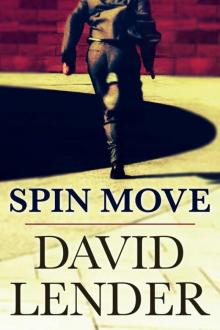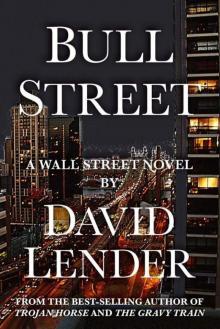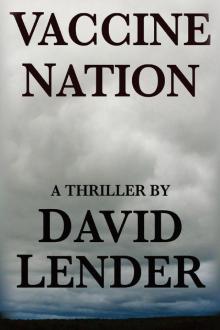- Home
- David Lender
Vaccine Nation Page 2
Vaccine Nation Read online
Page 2
Stevens heard someone crashing up the steps like a buffalo, a yell like a wounded animal, then some scuffling and what must’ve been a couple of guys running up the stairs. He turned and saw one guy get to the top, duck into the first office and lean against a woman standing there, then push her aside. Then another guy came up the stairs with—holy shit!—a Dirty Harry-sized piece with a silencer on it. On instinct, Stevens flipped open his holster and grabbed his service revolver. As he did, the guy with the gun reached up and put a round square in the big guy’s back, and the big guy went down like a tree right in front of the woman. Stevens now held his Smith & Wesson in both hands, crouched in firing position as the guy with the gun bent down and started reaching into the big guy’s pocket.
No clear shot. The woman was in the way. “Freeze!” Stevens yelled.
The guy with the gun glanced back and pulled off a round without even seeming to move. Stevens felt his left hip explode in pain and found himself on his back, looking upside down at the guy, who now turned and pointed the piece at him. Stevens’ arm was outstretched. He fired a crazy round over the guy’s head and when the guy ducked Stevens rolled onto his stomach, aimed and squeezed the trigger one, two, three, four times as the guy dived down the stairway and out of sight. Stevens dropped his head to the floor and everything went black.
Stark skidded to a stop about a quarter of the way down the stairway, got up and bounded down the rest of the steps and out the door. He held the Ruger at his side as he turned down Broadway, seeing the other cop still sitting in his squad car. How the hell hadn’t he heard the shots? The guy must be deaf. Stark slid the Ruger back into its holster and turned to look into a store window to conceal his movements. He zipped up his jacket and started toward 79th Street. He’d abandon the Taurus across the street. Leaving Maguire’s picture in it was dumb, but who cared? The cops would know it was a hit anyhow. Stark’s heart was still thudding against his chest when he reached 72nd Street and hailed a cab. Inside, he pulled out a handkerchief and wiped Maguire’s blood off his gloves. A clean kill on Maguire, no question. But the client would be pissed he hadn’t been able to check Maguire’s pockets, even see if Maguire had handed anything off to the girl. And she’d gotten a good look at him. He’d have to circle back on that. The cop was unfortunate. If he lived he might be able to ID him, too. And if he didn’t live, well, that would make for unnecessary heat that might send him underground and out of work for a while, at least in the States. Overall, messy. Not a good day’s work.
Dani didn’t think it was possible to choke on air, but that’s how she felt. She gasped for breath and knew air was flowing in, but somehow it seemed to be suffocating her. She stood in front of her desk. Her knees were weak and she slumped backward, supporting herself with her hands behind her on her desk. Her ears rang from those awful shots, and she felt sick to her stomach from the smells in the room—blood mixed with gunpowder. She stared down at the man lying at her feet. He must be Dr. Maguire; he’d arrived promptly at 9:00, their scheduled time. She looked across the hall and now saw two people bent over the cop, who wasn’t moving. That snapped her out of her paralysis because now she knelt down and put two fingers on Maguire’s neck to check his pulse. Nothing. She realized she clutched a USB flash memory drive in her palm, and now remembered Maguire had thrust it there before he shoved her away. She slipped it into her blazer pocket.
Sirens, and a moment later a single uniformed cop ran up the stairs, glanced at Maguire, and then went in to tend to the other cop. By the time the paramedics arrived, Dani’s stomach was beginning to settle. She wanted to go back behind her desk and sit down, but was still afraid to move. As the paramedics took the wounded cop away, two men in suits appeared at the top of the stairs. They spoke to the other cop for a few moments, then came over to Dani’s office. The short one bent over and started going through Maguire’s pockets. Dani recoiled. Even if it was the man’s job, it was disgusting. Ten minutes ago Maguire was a man who ran to her and implored her with desperate eyes. Now he was a carcass to be sifted through for evidence.
The other man who approached Dani was taller and skinnier, with watery eyes. “I’m Agent Wilson. FBI.” He flipped open a wallet-sized case and showed her a badge.
Dani felt her mouth move but no sound came out. She realized she was clutching the desk behind her as hard as she could with both hands.
“Tell us what happened,” Wilson said.
Dani cleared her throat. “I was waiting in my office for my appointment with Dr. Maguire when I heard a commotion on the stairs and then he ran in. His face was white and he was bleeding. He grabbed me and then pushed me away just as—” Dani heard the tremor in her voice, realized she was spewing words and took a deep breath to slow herself down, “—another man came in with a gun and shot him in the back.” The horror of it come back to her. My God. She’d actually seen a man murdered in front of her.
Wilson didn’t show any reaction, just stood looking at her through those watery eyes.
Dani went on. “Then the man bent over and started poking around in Dr. Maguire’s pockets. At that point someone yelled ‘freeze’ or something from across the hall, and I saw a policeman with his gun outstretched, and then the policeman went down when the man shot him and I dove under my desk and heard three or four more shots. When I looked up the man with the gun was gone and the policeman was laying face down.”
Wilson seemed to be waiting for Dani to go on. When she didn’t, he said, “You said Dr. Maguire. Do you know him?”
“No, but we had an appointment, and I’ve been talking to him on the phone for some time to set up a meeting.”
“You sure it’s him?”
Dani paused. Actually, she wasn’t. “I assume it’s him.”
The man looked down at Dani’s hands.
“How’d you get blood on you?” Dani looked down at her hands and noticed they were bloody. Her blazer, too. “I told you. The man grabbed me and almost fell over on me, then shoved me aside.”
“You just called him ‘the man,’ not ‘Dr. Maguire.’ “ Wilson said, still observing her with no expression.
“I already told you, I assume it was Dr. Maguire.”
“Listen, we need you to cooperate.”
Huh? Now Dani was annoyed. She felt her fingernails scraping the underside of the desk behind her. “What’s that supposed to mean?”
The short man finished going through Maguire’s pockets. He looked up at Wilson and shook his head. “He’s got a knife wound in his back,” the short man said.
Wilson nodded, then looked at Dani. “You’re not giving us anything,” he said.
Dani just stared at him. Now she was angry. Was this guy just dense, or was he fishing for something in particular?
Wilson said, “You expect us to believe this man, Maguire—Dr. David Maguire, a senior research biologist at Pharma International—comes in here dying with a knife wound in his back to speak to you or give you something, and you don’t know him?”
“I don’t expect anything. You asked me what happened, and I’m telling you.”
“Why did he come here?”
“I told you. I’ve been calling about an interview, and he wanted to meet me first.”
“That’s all?”
Dani decided she didn’t want to tell Wilson she believed that there might have been something more on Maguire’s mind than that. She shrugged.
Wilson said, “Who set up the meeting?”
“He did.”
“Who introduced you? You obviously had a reason to talk to him, and you didn’t call him out of the blue.”
“I was introduced through a friend of his. John McCloskey.”
“That KellerDorne guy? The whistleblower?”
This was getting weird. She realized that it was strange that the FBI was probing her about Dr. Maguire even before the homicide cops showed up. And this guy, Wilson, knew who John McCloskey was with no prompting. Not exactly a household name. And how did he refer to Magu
ire? A research analyst at Pharma. How would he know that?
Wilson said, “What did he give you?”
She leveled her eyes at him. No way she was telling. “Nothing.”
At that moment two more men in suits appeared at the top of the stairs, followed by six or eight more, some with bulky cases, some uniformed cops. Wilson turned to them. “She’s all yours, guys. We’re done here.” The partners left.
The two suits who just arrived looked at each other as if in confusion. They turned their backs to Dani and spoke to the uniformed cop, the one who arrived first, for a few moments. Yes, something really odd was going on. She got the idea that these cops had no clue who the FBI guys were, or why they were here. If they really were FBI.
She put her hand into her blazer pocket and felt the USB flash memory drive. It had to be why Maguire wanted to see her. She remembered that he said something to her about “being on the right side.” She eyed the men talking to each other in front of her and decided that until she figured out what was going on, she’d keep her mouth shut about it.
TWO
GROVER MADSEN SAT IN THE conference room attached to his office suite on the 50th floor of the Pharma International building on 42nd Street in New York, admiring the Chrysler building across Lexington Avenue. The stainless steel scalloped arches on the spire were like Art Deco sculpture, something lost long ago to the bland world of today. Pharma’s offices were in a soulless glass box. Madsen sighed and looked back into his conference room. Sullivan, his new head of the Vaccine Division, was droning on about this year’s initiative on the swine flu and pneumonia vaccines. New initiative, my ass. Everything today was couched in these bullshit strategy terms, in part because of those assholes from McKinsey, the management consultants the board insisted on hiring, that had been traipsing around here for nine months. He couldn’t figure out why as CEO he hadn’t shut that down. All the man-hours wasted on useless doublespeak when people should be keeping their noses in their business, getting some real work done.
Madsen leaned forward. “Gary, cut to it will you? I don’t need to hear about ‘influencers’ and ‘inducing trial.’ I just need to know what you’re going to do about getting moms into their doctors’ offices and drugstores in the first place, then how you’re going to get them to give their kids, their husbands and themselves flu shots in the off-season.”
“Well, Grover…,” Sullivan said.
What the fuck. The guy was flatlining right in front of him. What the hell would he do in front of the Board? Or a group of securities analysts? Madsen said, “Let me make this easy. You know the little heart-shaped stickers with the words ‘I love my blank enough to get him/her the flu shot’? The ones we put on bulletin boards in Walgreens, Rite Aid and Duane Reade in the fall during flu season? That’s what we need. Something that will make mothers guilty about not getting their kids, their mothers, whoever, the flu shot. And in the off-season, so we can build how much extra revenue?” Madsen looked at the no-name numbers dweeb Sullivan brought with him.
The dweeb looked like he was choking on an oyster. “$1.2 billion, if we roll it out nationwide.”
Madsen said, “That’s exactly why we’re having this conversation. You get this up and running by May and it can impact the second-quarter earnings big time. All those vaccine shipments loading inventory into the trade—the drugstores, doctors’ offices, clinics, hospitals. It should be twenty to twenty-five cents per share in additional earnings. Huge.”
Stiles, the Chief Financial Officer, raised an eyebrow when Madsen said “$0.20 to $0.25 per share,” but didn’t say anything.
Sullivan was looking at Madsen like he had no idea what he was talking about.
Madsen said, “Look, I know you’re a chemist by training. But now you’re running the biggest vaccine business in the industry. You need to turn your mind upside down. What you’re selling isn’t any different than someone who’s peddling deodorant or candy bars. If it’s deodorant, make people afraid they stink. Candy bars, tell him they can make a bad day go away with a chocolate break.”
“But we’re selling health. Wellness.”
“Exactly. So sell it. Go for the jugular if you have to. Use guilt, moral coercion, whatever you have to. Something like, ‘You want your ninety-year-old mother to die of pneumonia because you’re too cheap to take her to Walgreens for a twenty-five-dollar shot?’”
“The price isn’t the issue of resistance. It’s that we’re in the off-season. No one goes for flu shots, or pneumonia for that matter, in the spring.”
“So ask them if they want to watch their mothers suffocate on the fluid in their lungs in May because they’re too dumb to realize pneumonia doesn’t know it’s not September. And neither does the flu. Viruses don’t give a shit about the calendar. They’ll kill you all year. Sell it.”
Sullivan was scowling.
Stiles said, “Laying it on a little thick, aren’t you, Grover?”
Madsen said, “Look, I’m not being literal. And I’m not scripting it, but that’s the kind of subliminal message you need to get across. We’re the number one vaccine maker in the country, the most important to the national vaccine program. The CDC, NIH and the FDA are all expecting us to take the lead, show the industry how it’s done. And, Gary, I realize you’re not a marketing guy, but I put you in this job and you’re going to need to step up, big time.”
Sullivan looked flustered. “I’m up to the job, Grover. I meant this to be a progress report, not a fully fleshed-out strategy.”
“Then learn something from this meeting. I can’t afford—we can’t afford—to take these things one step at a time. It’s April, and we’ve made a commitment to the government to roll out this vaccine blitz in May. So get on it.”
Stephanie Doonan, Madsen’s assistant, opened the door from his office to his conference room and held up a note. Madsen nodded back. “Go on,” he said to Sullivan, “call me when you can get us to an incremental twenty-five cents per share in the second quarter. If I don’t hear from you in a week, I’ll assume you can’t do it and I’ll get somebody who can.” Madsen got up and walked to the door. He looked at the note Stephanie handed him, strode back into his office and picked up the phone.
“Hi, little girl. What’s up?”
“Hi, Daddy. I need some advice.”
The wedding again. Why wasn’t the mother-of-the-bride tending to this minutia? He shrugged. Because Regina’s a Philadelphia social-royalty gal who spends all day on her charities. “Sure. What’s up?”
“Mother says the cake shouldn’t be taller than Jeffrey. It’ll make him look short in the photos.”
Madsen wanted to say, “Jeffrey is short,” but restrained himself. He didn’t want to upset Lauren, and he knew he was too hard on Jeffrey, probably because nobody was good enough for his little girl. She was the best thing he’d ever done in his life, and he’d done a lot. “Your mother’s always thinking. And she’s right. You don’t want anything to take away from you and your dress, the stars of the show.”
“Thanks, Daddy. Sorry to pull you away.”
Madsen sat back, satisfied. He’d made a pledge when Lauren was born that he’d always make time for her. He still remembered holding her as a baby. Flying the chopper to see the Yankees at the stadium. Taking her to eleven pro ballparks, one each year, all Yankee games, from the ages often to twenty-one. She was the only reason he’d continued to live in Philadelphia, commuting to New York every day by chopper after Braxton Pharma’s merger with Pharma elevated him to the Pharma CEO job. He didn’t take the apartment in New York until after Lauren went away to college. And now she was marrying a short knucklehead and he’d probably only get to see her on holidays.
When Madsen returned to his conference room, Sullivan and crew were gone. Stiles sat there, waiting to brief Madsen on the financials and go over his script for the quarterly earnings conference call for the securities analysts and stockholders.
“Who wound you up?” Stiles said.
Madsen sat down. “It’s part of the job.”
“Did you really have to break Gary’s balls like that? You only put him in the job a month ago.”
“And he’s not exactly hitting the ground running.”
“He’s a good man. Give him some time.”
Madsen took in Steve Stiles. Mid-50s, going on 70. Slicked back hair from the 1960s, a monochrome blue suit, and always the white shirt and that ridiculous fucking bowtie. The perfect corporate number two man. No agendas. A straight talker who could keep his mouth shut when he had to. And as smart as they came. Madsen had known Stiles for 20 years, back from the Braxton Pharma days. Madsen trusted him; more than that, Madsen relied on him. He moderated Madsen’s tendencies toward ebullience. And more than once, Stiles told Madsen that he was the conscience Madsen didn’t have. He always kept a stash of expense accruals that he could dip into, reverse out into income to goose earnings when they were below Wall Street’s quarterly earnings estimates. But he’d never tell Madsen how much he kept baked into those reserves. And Stiles was right not to tell him: if Madsen knew, he’d binge out and book them all in one quarter, feeding his ego on the kudos he’d get from the financial press for beating the hell out of the Street’s estimates, and luxuriating in the brief pop in their stock price. Yeah, he trusted Stiles. The steady one. And nobody, nobody got away with talking to Madsen the way Stiles did. Which was why Madsen usually listened to him.

 Arab Summer
Arab Summer Sasha Returns
Sasha Returns Spin Move
Spin Move Bull Street (A White Collar Crime Thriller)
Bull Street (A White Collar Crime Thriller) Vaccine Nation
Vaccine Nation Trojan Horse
Trojan Horse